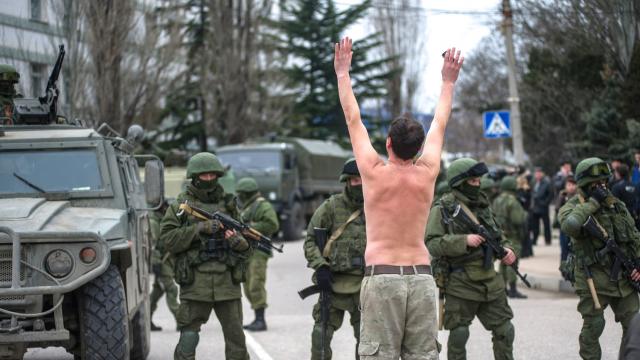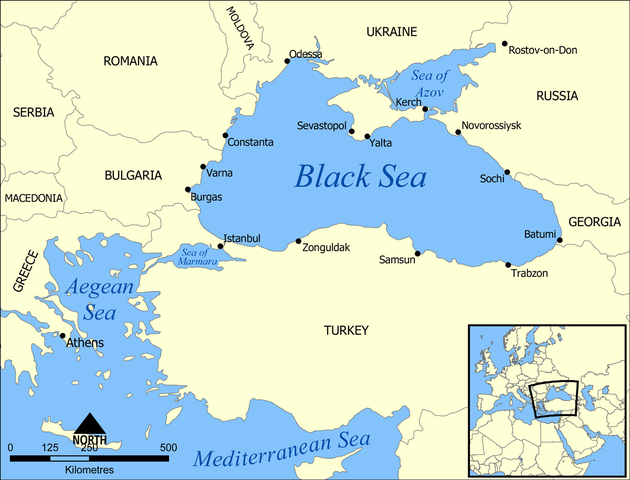
While it might have been nice to hear the Secretary of State say on Meet The Press Sunday that “you just don’t in the 21st century behave in 19th century fashion by invading another country on completely trumped up pre-text,” that characterization of Russia’s involvement in Ukraine is not the kind of aggressive military response that’s going to reassure those who see this as an issue of strong Putin versus feckless Obama. To people inclined to condemn American “weakness” in the face of Russian aggression, John Kerry’s condemnation of Russia’s military incursion into Crimea might sound like more empty words.
But that entire frame is mistaken, and not because Kerry also said “all options are on the table.” The fact is that Russia’s Ukraine move is an act of weakness, not strength — an act, as Kerry aptly characterized it, anachronistic in both moral and strategic terms. The fact that Russia is trying something like this exposes the country’s global strategy as fundamentally mismatched to 21st century realities. There isn’t a new Cold War.
There are basically two reasons, one practical and one ideological, behind Russia’s aggressive play to keep Crimea and Ukraine in its orbit. First, Russia has military interests in Ukraine, particularly in the Crimean city Sevastopol. Sevastopol is a critical Russian naval base, one that allows it easy access to the Mediterranean that it otherwise wouldn’t enjoy.
“The base’s significance was highlighted during the 2008 war with Georgia, when the Russian fleet staged blockades in the Black Sea and was used to launch amphibious landings,” The Financial Times’s Kathrin Hille writes. “It has also proved its usefulness to Russia in the Libya crisis, anti-piracy missions in the Indian Ocean and Moscow’s role in dismantling Syria’s chemical weapons.”
The second reason is ideological. Crimea has a 60 percent ethnic Russian population and was actually part of Russia until 1954. Moreover, Russia sees both Crimea and Ukraine writ large as part of its historical “sphere of influence,” the territory over which it naturally enjoys political and social hegemony. The more Ukrainians move to a pro-Western orientation — which is how the whole Ukraine crisis started in the first place — the more Vladimir Putin feels like Russia is being disrespected and isolated in precisely the place he likely feels it ought to dominate.
The military and ideological reasons are tied together by Putin’s core project of rebuilding Russia as a regional and global power. Sevastopol “is of critical importance as Russia seeks to regain some of the global clout that has been dwindling since the disintegration of the Soviet empire,” Hille concludes. If Ukraine slides out of Russia’s orbit, Putin loses both a critical military asset and an example of Russia’s renewed geopolitical ascendance. It makes sense that he’d go to dramatic lengths to ensure Ukrainians don’t endanger his plans.
But Putin’s project is a pipe dream. Russia will not come close to its Cold War power peak during Putin’s lifetime — especially if it relies on ham-fisted military interventions to keep its closest neighbors in line.
It is almost impossible to predict exactly how situations this volatile will go down. Russia may well push internal Ukrainian politics in its favor, or even successfully annex Crimea. But foreign occupations, as America has learned, are particularly poor ways to make the territory you’re occupying friendly. It may seem different for Russia in Crimea and East Ukraine, with their preponderance of ethnic Russians, but it’s not that simple. Ten percent of the Crimean population, for instance, are Tatars, a Muslim group that would make Russia’s life very difficult. The Tatars are well-organized and have a long history of putting up fierce resistance to Russian control over Crimea; they’re “the main reason,” according to Tufts University’s Oxana Shevel, that it’s hard to believe “Russia will be able to establish control and to effectively annex Crimea.”
“It is a nightmare for everyone,” Igor Sutyagin, a Russian military expert, told the Guardian. “The entry of Russian troops would be a deep humiliation for Ukraine … It would be a second Chechnya.”
An occupation of Crimea would be expensive and politically isolating. It also risks a damaging war with Ukraine’s relatively strong military, an unforced error given how restrained Kyiv has been to date. The very fact that Russia might need to annex parts of Ukraine to maintain political control betrays Moscow’s weakness: An invasion is a tool of the desperate, to be used only when safer, more cost-effective tools are no longer available.
Indeed, Putin has previously used more tempered strategies — cutting off gas exports, its U.N. Security Council veto, andarms sales — to modestly advance Russian interests. The military action in Ukraine is a tacit acknowledgement that the Ukrainian revolution has threatened Russia’s “national greatness” project too fundamentally for these risky options to be worth trying. Again, that’s an indication of Putin’s fundamental fragility, not Cold War cunning.
Russia’s turn to blunt military force in Ukraine is emblematic of the basic flaws behind its push to regain its global and regional standing. The reality is that Russia is a middling power with nuclear weapons; it can frustrate America in Syria, but it can’t make progress towards bending the world to its will using the sort of strategies it has tried to date.
Military power alone can’t do the trick. In a world of free trade and highly globalized markets, territorial conquest simply isn’t a good way to make your country stronger. In fact, it’s harmful. “War has lost its evident appeal,” political scientist John Mueller correctly notes, “because substantial agreement has risen around the twin propositions that that prosperity and economic growth should be central national goals and that war is a particularly counterproductive device for achieving these goals.” War won’t bring Ukraine into Russia’s fold, let alone a broader swath of Eastern Europe and Central Asia.
Russia’s military also isn’t what it once was. Russia spends a slightly higher percentage of its GDP on its military than the United States does, yet the United States still spends almost seven times as much in actual dollar amounts. Russia doesn’t have much room to expand its military spending, in other words, yet the size of its economy means it simply can’t come close to competing with the United States and its allies. Nor is Russia anything like China, where rapid economic growth means that it may have a chance to become a truly global power player.
That’s another thing Russia lacks. The United States has military bases around the world because it cultivated political relationships with all sorts of different countries. It’s telling that Russia needs Sevastopol — it doesn’t have the kind of friends that give it anywhere else to turn, plans for an economic “Eurasian Union” notwithstanding.
The more aggressively Putin acts, the more likely this quiet isolation is to deepen. Eastern European nations are alreadyeyeing Putin nervously, threatening to increase defense spending and tighten their ties with the West to balance Russia on its front door. The United States and European nations can leverage diplomatic and economic tools to punish Russia. Aggressive expansionism of the sort Putin may be trying in Ukraine not only fails to pay off geopolitically, but it ends up undermining the economic and diplomatic foundations of 21st century national power.
The more Putin attempts to tighten his grip on Ukraine, then, the more real power slips through his fingers. The Ukrainian situation should best be thought of as a matter of upholding international law, protecting Ukrainian sovereignty and democracy, and mitigating humanitarian risks — not refighting the Cold War.
3 WAYS TO SHOW YOUR SUPPORT
- Log in to post comments














